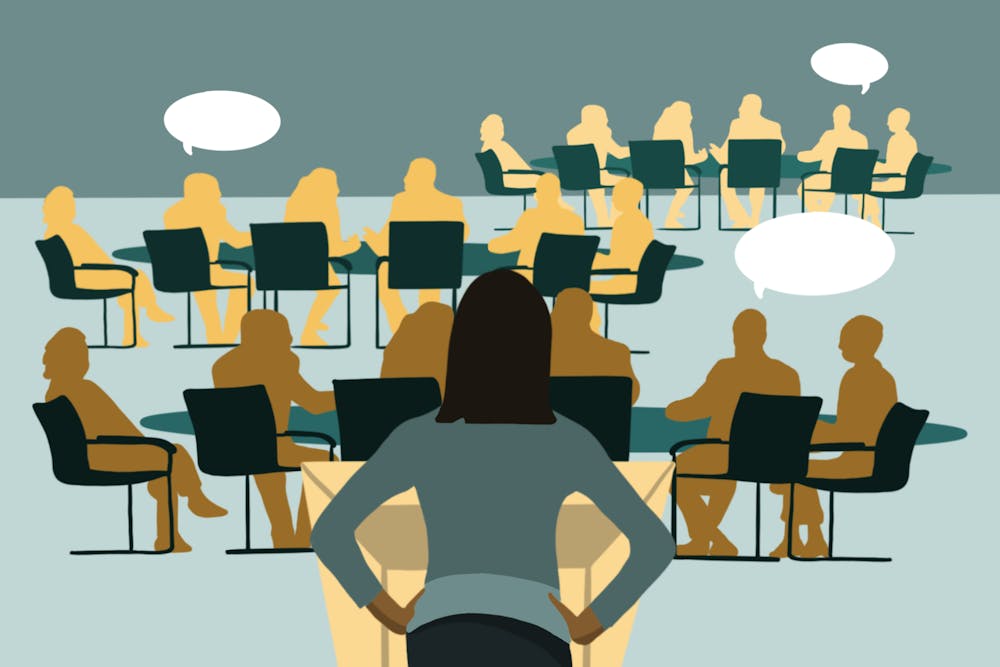After years of not having a voice, university employees outside the academic sector finally have a seat at the table.
For the first time in the university's history, it has introduced a new body of government: the staff senate.
The staff senate started its election process in December and spent January through June preparing once it had elected senators.
Film and media studies professor Mark Cooper is the current past chair, one of the leadership positions of the faculty senate. He said the faculty senate was a significant advocate for the staff senate to come to fruition.
"I was Chair of the Faculty Senate and with the support of many committees in the senate itself, (we) strongly advocated for the creation of the staff senate, worked closely with the people who are setting it up to, you know, to get it structured in a way that made sense to the staff," Cooper said.
President of the staff senate Shelley Dempsey said the faculty and Cooper specifically were beneficial with their start-up.
"They've been wonderful partners, and it's obvious that they just want to see us succeed," Dempsey said. "I came into office and so worked very closely with Mark on a couple of different things. He had great advice on how to run a meeting and a couple of other just leadership type of pieces of information that were very helpful."
Dempsey said having a staff senate is crucial because it makes the staff feel like they have a voice at the university.
"The only body that was being left off and from our campus community was the staff," Dempsey said. "Some things are similar with faculty, but there are also some things that are different."
Both the faculty and staff have been trying to focus on mental health in their respective senates. Cooper said the faculty senate welfare committee was one of the groups trying to think about faculty and staff mental health. He said one of the more challenging issues the faculty senate had to face during COVID-19 was faculty members who had to juggle their remote teaching with children who were remote schooling simultaneously.
"I mean it really, it's not just a university problem, it was a nationwide problem, but that was a really tough one," Cooper said.
Dempsey said that with COVID and the lack of summer break for the staff members, they had taken time to understand the staff's stress.
"Making sure people utilize their annual leave and when they need it, and their sick leave, and take those things that are part of their benefits package with the university, and that they look at their mental health as important as their physical health," Dempsey said.
Staff senate chair and community service committee member Christine Shelek said she was surprised more of her staff colleagues didn't know about the university's resources.
"I started talking about Gamecock Pantry, and the people that I were with had never heard of the Gamecock Pantry. And I thought I was like, 'That is so sad because y'all work here.' So, they didn't know, as staff members, what it was and that they could go to the Gamecock Pantry if needed," Shelek said.
Faculty senate chair Audrey Korsgaard said two main things ultimately need to happen to help with mental health efforts for faculty, staff, and even students.
"We all need to rebuild our resistance but also reset toward community building, because we haven't been face-to-face (and) lost a lot of the real high touch interpersonal relationships that bring with them graciousness and tolerance," Korsgaard said.
Korsgaard also said there need to be more local events for people to socialize.
"We need to have times for people to just bond, but we need to push that down, so it really happens everywhere," Korsgaard said.
Shelek said that it is great to have guest speakers at the staff senate meetings to know more people outside their departments.
"It's great because some staff may never be able to, you know, put a name with a face," Shelek said.
Shelek said she likes that she and her colleagues' voices are heard and that the senate can listen to individual feedback.
"I've had a form that I sent to everyone asking them, you know, if they had anything specific they want me to share with staff senate, whether that be, you know, positive or negative feedback, ideas, suggestions, because I am there to represent them," Shelek said.
Cooper said it's a crucial feature of academic institutions.
"(Academic institutions) can't work unless the people who have expertise in the core mission are involved in making decisions," Cooper said.

